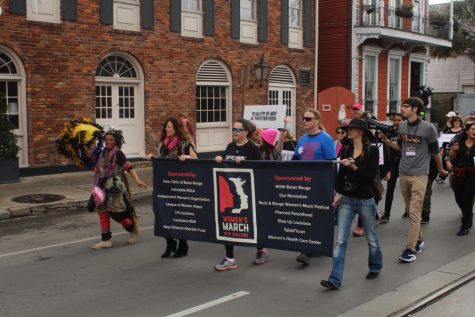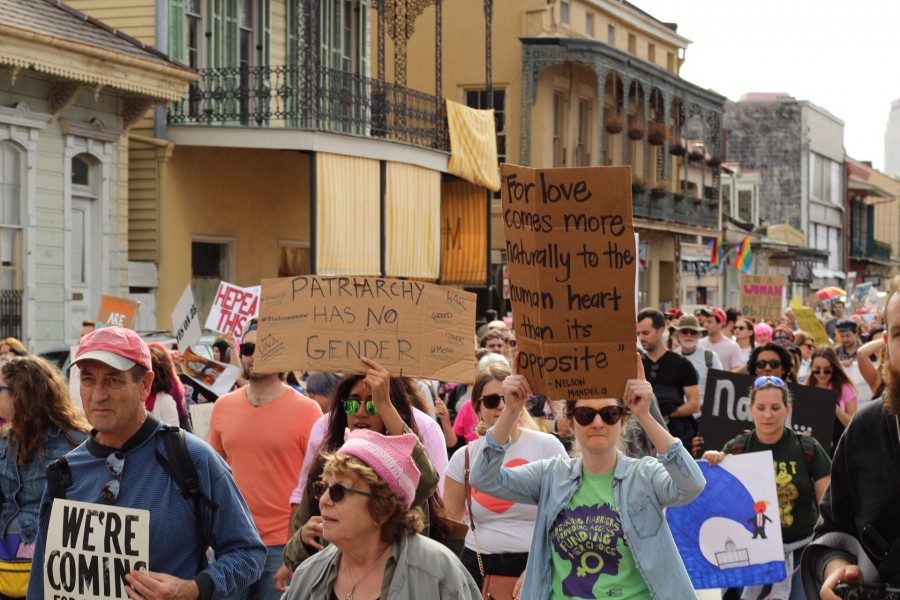Signs of solidarity: Tulane community participates in Women’s March, advocates for more action
Josh Jessiman | Photography Editor
Participants in the 2018 Women’s March walk through the streets of Downtown New Orleans holding signs.
More than 5,000 demonstrators took to the streets of downtown New Orleans on Saturday as a part of the nation-wide, weekend-long anniversary celebration of the 2017 Women’s March.
The event featured several speakers, including New Orleans mayor-elect, Latoya Cantrell, Helena Moreno, Democratic member of the Louisiana House of Representatives, and Nia Weeks, director of policy and advocacy for Women With a Vision.
According to the event’s Facebook page, the purpose of the march was to give women a chance to voice their opinions and grievances on issues like loss of healthcare, increased taxes, sexual assault and travel bans, which have been impacted by the current administration.

New Orleans residents assembled at Duncan Plaza to participate in the 2018 Women’s March.
“When we take part in demonstrations, we are exercising our rights of assembly and free speech so that those in power don’t forget who is really in charge: We the People,” Meredith Walker, an attendee who traveled from Austin, Texas, said.
Walker is the co-founder and executive director of Amy Poehler’s Smart Girls, an organization that attempts to make a positive difference through emphasizing individuality.
Tulane students gathered in the crowd of demonstrators assembled at Duncan Plaza, wielding homemade signs and chanting along to phrases and rhymes such as “This is what democracy looks like,” and “No Trump, no KKK, no fascist USA.”
“In high school, I never got to do anything specifically for women’s rights, but more like equal rights and stuff like that,” freshman Harshitha Vemulapalli said. “So it was nice to be able to just go out for our own gender. And seeing everyone from Tulane who went was definitely cool.”
In an effort address concerns about representation in last years Women’s March, intersectionality played a central role throughout this year’s anniversary. During her speech preceding the march, guest speaker Weeks highlighted the distinct struggles that women in different intersections face.
“Today, I am clapping for transgender women,” Weeks said. “Today, I am clapping for formerly and currently incarcerated women. Today, I am clapping for sex workers. Today, I am clapping for the woman who had to work her third shift of the day last night.”

Participants use Women’s March as a platform to express their feelings and concerns on a number of issues by making signs.
The nation-wide marches are only one of the many strategies that the National Women’s March has outlined in its Power to the Polls initiative, which aims to support the influx of women and gender minorities taking part in the 2018 midterm elections across the country. This increase in female candidates across the country has set a record for the number of first-time female candidates running for office.
“Demonstrations such as the women’s march galvanize us and unify us to take the midterm elections very seriously,” Walker said. “Holding elected leaders accountable has become more of a priority.”
While there are many demonstrators who feel optimistic about the movement’s ability to achieve its goals, there are also those, such as Jewell Prim, freshman representative for Tulane Women in Politics, who say they would like to see even more action take place.
“Many marchers seemed to only be there to show off their cool signs and wear matching outfits,” Prim said. “All of that is cool but when there is no action tied to the end then the march seemed almost aimless.”
Other students seemed to echo this sentiment, saying that participating in the march, while valuable, is only one small part of a much larger movement.
“In the end, you can’t just do one thing and be like, ‘Okay, I made a difference,'” Vemulapalli said. “You have to continue to take part. And that doesn’t mean you have to go to every march, but there are little things you can do in your everyday life to advocate for these rights.”
Your donation will support the student journalists of Tulane University. Your contribution will allow us to purchase equipment and cover our annual website hosting costs.

















Leave a Comment